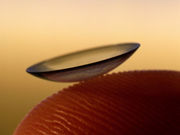Adhesion of AC trophozoites greater to untreated FP lenses; Boston Simplus reduces adhesion rates
FRIDAY, March 4, 2016 (HealthDay News) — Both rigid gas permeable (RGP) contact lens surface and multipurpose contact lens care solutions (MPSs) impact adhesion rates of Acanthamoeba castellanii (AC) trophozoites, according to a study published in the March issue of Ophthalmic & Physiological Optics.
Ga-Hyun Lee, from California State University in Chico, and colleagues examined the effect of MPSs on the adhesion of Acanthamoeba to RGP contact lenses. They inoculated AC trophozoites onto untreated RGP contact lenses (FP, Extra, or Menicon Z) and at 18 hours post-inoculation counted the numbers of trophozoites adhering to lenses under a phase contrast microscope (control). Adhering trophozoites were also counted at six hours post-inoculation on each of three RGP lens types with use of one of three MPSs (Boston Simplus, Menicare Plus, and O2 Care).
The researchers found that adhesion of AC trophozoites was greater to untreated FP than untreated Extra or Menicon Z lenses; compared with FP lenses, the surfaces of Extra and Menicon Z lenses were waxier, smoother, and more homogenous. Compared to controls, adhesion of AC trophozoites was significantly reduced for all lens types with Boston Simplus (P < 0.0001). On FP lenses only, Menicare Plus and O2 Care treatment reduced the number of adherent AC trophozoites significantly versus controls (P < 0.0001).
“The adhesion rates of AC trophozoites to RGP lenses depended on lens surfaces,” the authors write. “Appropriate RGP lens and MPS selection could decrease the prevalence of Acanthamoeba keratitis.”
Copyright © 2016 HealthDay. All rights reserved.








